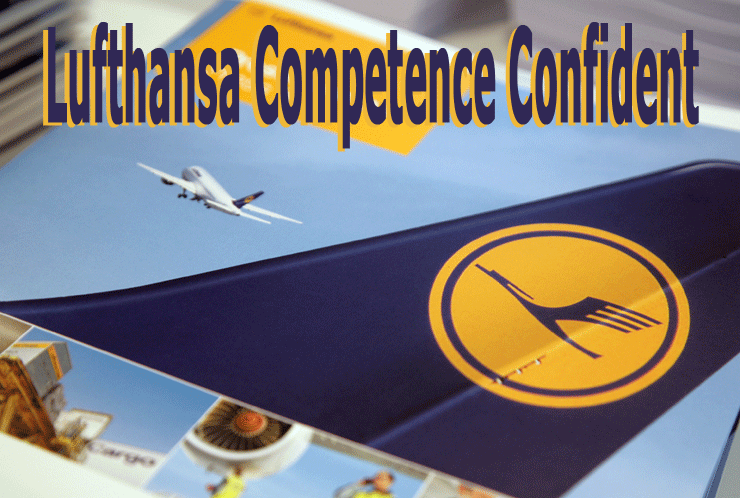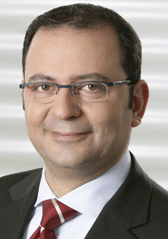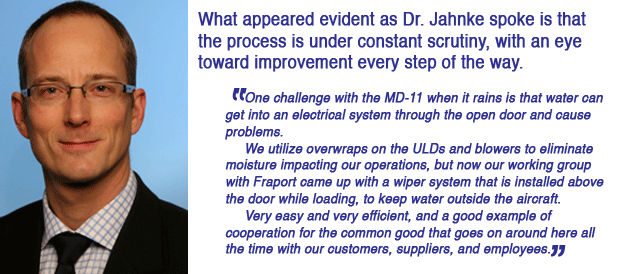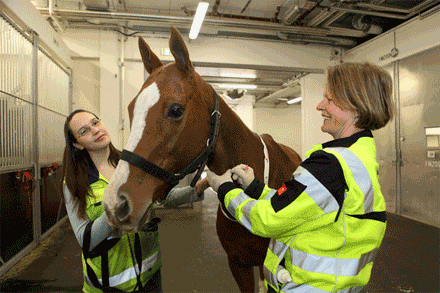Dr. Jahnke Profiles
Lufthansa Cargo Center
 Lufthansa
today announced some changes in staff. Dr. Mohammad Ali Seiraffi (right)
has taken over as Vice President Handling Frankfurt succeeding Dr. Andreas
Jahnke who now will be Managing Director of Lufthansa Consulting. Lufthansa
today announced some changes in staff. Dr. Mohammad Ali Seiraffi (right)
has taken over as Vice President Handling Frankfurt succeeding Dr. Andreas
Jahnke who now will be Managing Director of Lufthansa Consulting.
We sat with Andreas Jahnke in early December
discussing the last four years at the helm of a critical cargo assignment
at the very heart of a leading airline, an assignment that can be considered
a departure given the fact that he arrived there after leaving an entirely
different industry. But his background may have served him well, as
he delivered a fresh pair of eyes and some new thinking to a critical
task.
The Lufthansa Cargo Center at Frankfurt
International Airport handles more than 400,000 pieces per week, including
the home carriers’ action plus a dozen other airlines.
Consignments range from pieces as small
as brochures to pieces as large as a 96-ton machine part, with live
animals, high value items and time and temperature sensitive cargo sometimes
numbering in the hundreds of thousands of units per week.
 |
But to look and listen to Dr. Andreas
Jahnke, Lufthansa Cargo Vice President Handling, as he spoke of the
impact of riding herd over four “Competence Centers” at
Lufthansa Cargo, things appeared to be all good.
Four of Lufthansa Cargo’s key products
are steered at Frankfurt via separate Competence Centers including:
Airmail, Animals, Temperature Control and Valuables.
The Lufthansa Cargo Center at FRA was
being dedicated as a new Perishables Center in December.
“Our largest activity here is standard
freight, but we also handle quite a large amount of our tdFlash branded
express product.
“Our Air Mail and Animal Lounge
and, of course, temperature control business continue to grow as well.
“The worst surprise in 2011 was
the night flight curfew imposed by the local court in Hesse.
“It was, to put it mildly, a shock
to the system to have to deal with the loss of 30 percent of total flights
that used to go at night.
“Now we are not emptying the LCC
as before, but rather allocating space and conducting storage activities
for the shipments and pallets we build up.
Of course, cargo is flown as booked and
delivered on time, but the impact on our business model is palpable.
 “Air
cargo operates with certain peaks of activity, so the night curfew has
greatly added to our activities in the mornings, when we have to get
out shipments whilst shipments arrive that need to be broken down. “Air
cargo operates with certain peaks of activity, so the night curfew has
greatly added to our activities in the mornings, when we have to get
out shipments whilst shipments arrive that need to be broken down.
“The inability to fly at night has
added even more of a critical nature to our daily operations here.
“Cargo needs the night is quite
valid, especially when considering that the new runway here, while increasing
punctuality of airport operations, cannot handle our MD-11F operations.”
Although he was not directly responsible
for day-to-day operations of the new cool center Andreas Jahnke was
animated about it on the eve of its opening.
“As the pharmaceutical industry
is developing, Lufthansa Cargo is expecting to see double-digit growth
figures in the next few years ahead.
“Where we previously handled our
Cool/td consignments at Perishable Center Frankfurt (PCF), the necessity
for the new pharma-zone, driven by capacity limits at PCF, are now handled
in our new facility so Cool/td-Active and Cool/td-Passive consignments
get the best possible conditions.
“The new center is equipped with
state-of-the-art cool storage rooms for four different temperature ranges,
exclusive ramps for delivery and goods acceptance, an exclusive Competence
Center Temperature Control (CCTC) supervision team on call 24/7 and
an exclusive service provider, handling:counts.
“Another advantage is that the pharma-zone
is located within the security hub and has direct access to the apron.
“This guarantees short distances
and minimizes cross-transfer between different facilities.”
Dr. Jahnke holds his Doctorate in Natural
Science. He came to air cargo from the retail food business, where he
purchased logistics services and was responsible for getting the goods
from manufacturer to store shelves.
He noted that compared to retail or others
manufactured goods such as automobiles, he was surprised at how “ancient”
the logistics efficiency curve in air cargo was (and in some respects
still is), making the point:
“In my retail food business experience
in Germany, we would say our mission was to know ‘from which pig
came the sausage,’ which may at first sound like overregulation,
but in fact is an indication up and down the line of greater efficiencies,
including logistics.
“Moving into air cargo, I was amazed
by the amount of paperwork, sometimes adding up several kilos per flight.”
The industry is changing, Dr. Jahnke insists.
Slowly, he adds.
Dr. Jahnke admitted that operating a transportation
hub that serves a fleet of aircraft with weight and width and length
restrictions revealed a fascinating aspect of his job.
“Building shipments and the loading
of aircraft is quite like putting together the pieces of a puzzle.
“The process is all about people
and their experience.
“What’s more, there are several
different types of puzzles.
“In each case the approach is three
dimensional, with the size of the aircraft space accepting the cargo
as paramount.
“The buildup must consider how,
for example, 100 pieces will be placed on a single pallet with heavy
items on the bottom.
“Also, the types of cargo must be
taken into account, with dangerous goods, and foodstuffs and other items
that cannot be included.
“When it comes to bringing everything
together for a single flight, the combination of pallets and outsized
air cargo pieces, such as oil pipelines or pieces of machinery equipment,
is loaded with the expert touch of some very experienced and remarkable
people here at Lufthansa Cargo.
“From our capacity management to
load planning, right to the final buffer area where Fraport handling
picks up the ULDs for loading aboard the aircraft, everything, including
the exact position where the cargo will ride aloft has been determined.
“During the loading process there
is one Lufthansa Cargo employee, a loadmaster, for every flight making
sure things go right.”
Interestingly, loadmaster duties at Lufthansa
include a higher percentage of women employees as compared to other
Cargo Competence Center employments due to the less physical nature
of the task and also because “some flights require a loadmaster
to accompany the cargo, affording some interesting travel opportunities,”
according to Dr. Jahnke.
What appeared evident as Dr. Jahnke spoke
is that the process is under constant scrutiny, with an eye toward improvement
every step of the way.
“Last week we held a meeting with
Fraport (Lufthansa Cargo signed a contract with Fraport in 2010 that
runs through 2018) around the subject of how to improve the loading
process under certain weather conditions, such as rain and other situations.
“One challenge with the MD-11 when
it rains is that water can get into an electrical system through the
open door and cause problems.
“We utilize overwraps on the ULDs
and blowers to eliminate moisture impacting our operations, but now
our working group with Fraport came up with a wiper system that is installed
above the door while loading to keep water outside the aircraft.
“Very easy and very efficient, and
a good example of cooperation for the common good that goes on around
here all the time with our customers, suppliers, and employees.
“Now if we could just do something
about that night ban.”
Geoffrey/Flossie |





 “Air
cargo operates with certain peaks of activity, so the night curfew has
greatly added to our activities in the mornings, when we have to get
out shipments whilst shipments arrive that need to be broken down.
“Air
cargo operates with certain peaks of activity, so the night curfew has
greatly added to our activities in the mornings, when we have to get
out shipments whilst shipments arrive that need to be broken down.